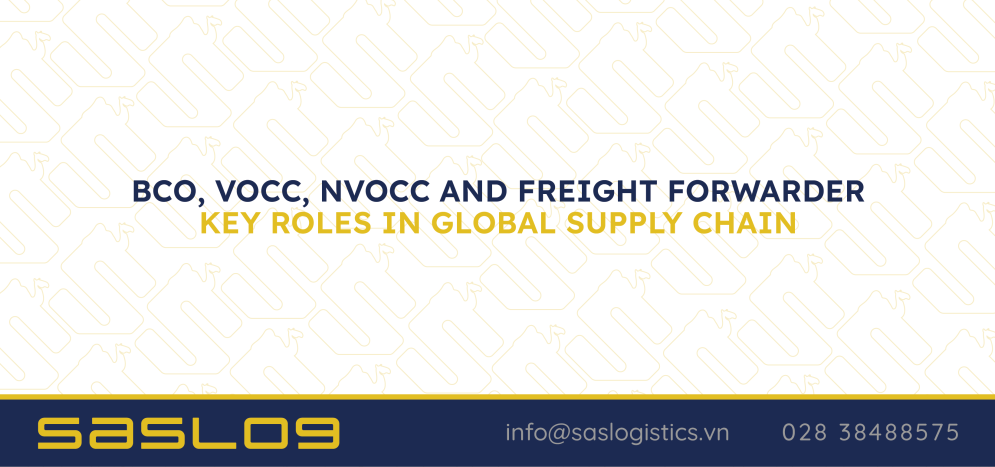Understand the critical roles of BCO, VOCC, NVOCC, and Freight Forwarder in the global supply chain. Learn how each entity contributes to optimizing your import-export operations and selecting the right logistics partners.
In the vast and complex world of international logistics, moving goods from point A to point B is far more than just transporting cargo from a warehouse to a port.
Behind every shipment lies a seamless collaboration between multiple entities within the global supply chain, each playing a distinct yet indispensable role.
Understanding the differences between BCO (Beneficial Cargo Owner), VOCC (Vessel Operating Common Carrier), NVOCC (Non-Vessel Operating Common Carrier), and Freight Forwarder is the key to optimizing logistics costs, managing risks, and enhancing supply chain efficiency.
1. BCO – Beneficial Cargo Owner
A BCO is the actual owner of the cargo — typically a manufacturer, importer, or exporter. They are fully responsible for their goods, from production, packaging, and customs declaration to the final delivery.
Key Characteristics of BCO:
– Directly contracts with carriers or freight forwarders for transportation.
– Usually has large shipment volumes, allowing them to negotiate better freight rates.
– Possesses end-to-end control over the supply chain.
Example: A global retail group importing thousands of containers annually from China to the U.S. is a typical BCO.
For businesses aiming to optimize logistics expenses, understanding the BCO’s role clarifies your rights and responsibilities in shipping contracts.
2. VOCC – Vessel Operating Common Carrier
A VOCC is a shipping line that owns and operates vessels, responsible for transporting goods between ports. Global giants like Maersk, CMA CGM, and MSC are prime examples of VOCCs.
Key Characteristics of VOCC:
– Owns ships, containers, and extensive port networks.
– Issues the Master Bill of Lading directly to customers.
– Plays a core role in international ocean freight, ensuring a smooth global flow of goods.
VOCCs typically work with both BCOs and NVOCCs, serving direct shippers as well as intermediaries.
3. NVOCC – Non-Vessel Operating Common Carrier
An NVOCC is an intermediary carrier that does not own vessels but operates similarly to a shipping line. They purchase space from VOCCs and sell it to smaller shippers (SMEs) under their own brand name.
Key Characteristics of NVOCC:
– Issues their own House Bill of Lading (HBL) to clients.
– Maintains strong relationships with multiple carriers, offering flexibility in routes and pricing.
– Provides LCL (Less than Container Load) services, consolidating smaller shipments.
In essence, NVOCCs empower small and medium-sized enterprises to access international shipping services without owning containers or booking directly with carriers.
4. Freight Forwarder – The Logistics Coordinator
A Freight Forwarder acts as the logistics intermediary, planning and coordinating the end-to-end shipping process — from cargo pick-up and customs clearance to final delivery. Unlike NVOCCs, Freight Forwarders do not issue their own Bill of Lading; instead, they represent shippers when dealing with NVOCCs or VOCCs.
Main Responsibilities of a Freight Forwarder:
– Plan optimal shipping routes and transit schedules.
– Handle customs clearance, documentation, insurance, warehousing, and inland delivery.
– Book cargo space with VOCCs or NVOCCs.
– Track shipments and manage any in-transit issues.
Freight Forwarders are the vital bridge between importers/exporters and carriers, ensuring smooth, cost-efficient, and transparent logistics operations.
5. Interconnected Roles in the Global Supply Chain
BCOs, VOCCs, NVOCCs, and Freight Forwarders do not operate in isolation — they form an interdependent logistics network that keeps global trade moving. Each entity contributes unique value toward a shared goal: fast, safe, and efficient cargo movement worldwide.
| Entity | Main Role | Key Feature |
| BCO | Actual cargo owner | Controls supply chain, contracts directly |
| VOCC | Shipping line | Owns vessels, issues master bills of lading |
| NVOCC | Non-vessel carrier | Consolidates cargo, issues house bills |
| Freight Forwarder | Logistics agent | Coordinates shipments, handles documentation |
Understanding these relationships allows businesses to:
– Choose the right logistics partners
– Optimize freight costs
– Minimize risks in international trade
Mastering the differences between BCO, VOCC, NVOCC, and Freight Forwarder is essential for any company engaged in global logistics or international trade.
Depending on your company’s size, goals, and internal capabilities, you can either work directly with VOCCs or partner with reliable NVOCCs and Freight Forwarders to enhance efficiency and reduce logistics costs.
Learn more about comprehensive logistics solutions at SAS Logistics
and follow our latest logistics insights and industry updates on SAS Logistics Facebook


